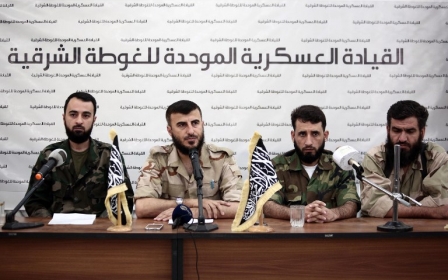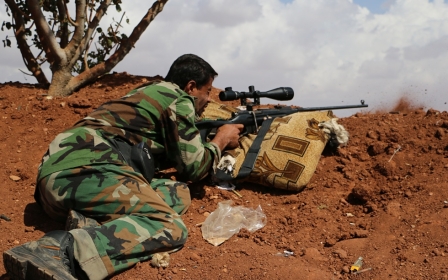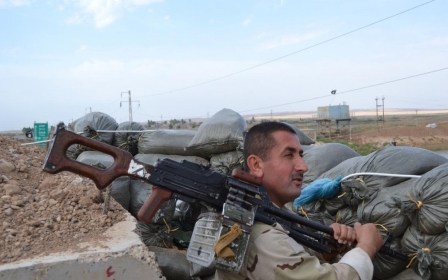Peshmerga entrance into Kobane strengthens Kurdish ties

Following a number of delays, the much-anticipated plan to deploy Iraqi Kurdish military forces (Peshmerga) to the besieged city of Kobane took place on Tuesday. According to Kurdish new agency Rudaw, 150 fighters equipped with heavy weapons are expected to reach Kobani today
According to Kurdish new agency Rudaw, 150 fighters equipped with heavy weapons are expected to reach Kobane on Tuesday, where they will bolster the largely Syrian Kurdish forces in the border town.
Intra-Kurdish politics can be a confusing affair, a myriad of parties and ideologies make Kurdish politics seem a bewildering mess of incoherence that is riddled with political divisions.
These divisions came to light once again when a new wave of attacks by the Islamic State (IS) hit Kobane on Sunday and the Peshmerga have yet to arrive. Speculation as to why the Iraqi Kurds were not deployed earlier varies from “technical reasons” to Kurdish politicians’ inability to coordinate and cooperate – the latter being the more likely reason.
However, in the face of the Islamic State onslaught on Kobane in northern Syria to Jalawla on the Iranian border, Kurdistan’s formerly bickering factions appear to be burying the hatchet and looking for ways to work together.
Old divisions
The leading Syrian Kurdish Democratic Union Party’s (PYD) close ties to the Kurdistan Workers’ Party (PKK) - as well as their alleged hegemony over Kurdish Syrian politics, at the expense of factions loyal to Iraqi Kurdish President Massoud Barzani - has distanced them from Barzani’s Iraq-based Kurdistan Democratic Party (KDP).
Relations between the two have been fraught since the founding of the PYD in 2003 and have gradually deteriorated due to a number of contrasting ideologies, political disagreements and Barzani’s dwindling influence in Syrian Kurdistan versus the PYD’s ever-growing support.
Despite the IS threat facing both Syrian and Iraqi Kurds forces, their political disagreements have meant that although there are ‘national’ and ethnic ties that bind them, the Kurdistan Regional Government (KGR) has largely chosen to remain on the sidelines as events in Kobane unfolded.
That finally changed last week. After a month-long siege of Kobane, neighbouring Iraqi Kurds voted unanimously to send in their own soldiers to assist the People’s Protection Units (YPG), which serve as the government of Syrian Kurdistan’s official militia.
The YPG has been fighting al-Qaeda’s Syria offshoot Jabhat al-Nusra and IS for over two years with a limited supply of weapons that it largely procured through the black market or won as spoils of war.
The Peshmerga’s entry into the conflict is therefore welcome, although there is uncertainty about how much help the Peshmerga will actually supply.
The Peshmerga Ministry’s chief of staff Jabar Yawer told Middle East Eye that the small unit of soldiers will be sent to Kobane via Turkey to provide cover to fighters in the town, but will not be deployed to the frontlines.
PYD representative to the UK Alan Semo has already questioned the efficacy of this policy. He told MEE that while the PYD is happy for the support and thinks it bodes well for KDP-PYD relations, it is adamant that the Peshmerga should integrate into the YPG command structure and not create a separate unit.
The military deployment also comes on the back of several other developments, which all indicate that the KDP-PYD have managed to rekindle relations.
On 15 October, the Kurdistan Parliament announced it’s recognition of Syrian Kurdistan’s three autonomous cantons. Then on 19 October, US planes airdropped 21 tons of Iraqi Kurdish ammunition and weapons into Kobane.
Finally last week, an agreement was penned between the PYD and the Kurdish National Council – a political coalition with close ties to the KDP – which outlined steps to improve intra-party cooperation.
Small steps
But the situation continues to be complicated. Turkey has asked the PYD to cut ties with the PKK, and instead ally with the Free Syrian Army (FSA) to fight Syrian President Bashar al-Assad.
Small steps have been taken in this direction and the PYD recently released a statement claiming that is was strengthening links with the FSA, but commentators suggest that an outright break with PKK is unlikely.
The PKK has fought a bloody three-decade war for independence from Turkey and is seen as a terrorist organisation by Ankara, Washington and the EU, but the group is influential, well-trained and is increasingly being seen by the west as a potential partner in the fight against IS.
Moreover, while the Syrian Kurds have little love for the Syrian government, they are in no position to open up a second conflict, and fight Assad and IS at the same time - even if they join forces with the FSA.
Turkish Foreign Minister Mevlut Cavusoglu announced that they would be assisting the Peshmerga to cross into Kobane – possibly, as some analysts have suggested, in an attempt to garner international support after widespread condemnation of its perceived idle response to the violence across the border.
However, trust between Syria’s Kurds and Ankara is low, as the PYD sees Turkey as attempting to leverage its connections with the Kurdistan Regional Government (KRG) to control security affairs in Rojava, in order to squash Syrian Kurdistan’s nascent self-rule.
“We have no interest in Turkey being any part of the plan,” said PYD’s Semo.
Into this complicated equation has stepped the United States, which has all but reversed its policy towards Syria’s Kurds in its attempts to stall IS’s advance.
For a country that has repeatedly delayed entry visas for the PYD’s Political head, Salih Muslim, it has now conducted over 130 airstrikes in the space of two weeks to protect his hometown of Kobane from IS attacks.
President Recep Tayyip Erdogan’s response that US airdrops were “wrong” reflects Turkey's open displeasure with US policy, amid concerns that the peace process between the PKK and the Turkish government may not last.
Iraqi Kurdistan
As for Iraqi Kurdistan’s fragile intra-party politics, marred by a bloody civil war in the 1990s, the historically rickety relations between the KDP and the opposition party, the Patriotic Union of Kurdistan (PUK), may find common ground and temporary respite in their joint military assistance to Kobane.
The left-of-centre PUK is known for having close ties with the PYD and expressing support for the Kurdish Syrian autonomous cantons when the KDP did not. Although the KDP and PUK oversee different Peshmerga units, the Peshmerga Ministry’s Yawer explained that the deployed soldiers will operate under his ministry and will not be affiliated to either party.
The Kurdish regions of Iraq and Syria appear to be uniting through adversity, as fear of IS is increasingly fueling the West’s need for a strong Kurdistan. The lack of political or military cohesion among other groups combatting IS in both Syria and Iraq has resulted in the US turning its head towards the Kurds.
Part of the challenge now seems to lie in whether the Kurds will be able to form a strong and lasting union among each other rather than unite in a pseudo coalition.
Whether the threat from the Islamic State is enough to heal decades-old divisions within different factions of Kurds is yet to be seen, but the first seeds of pan-Kurdish cooperation appear to have been sown.
It is unlikely that Iraqi Kurdistan’s desire for independence can be reconciled with Syrian Kurdistan’s more modest goal of autonomy. However both factions are unapologetically carving out their own realities, just as IS have done. But the bracket of support provided by coalition warplanes affords the Kurds a chance to focus on the ties that bind, rather than those that divide.
New MEE newsletter: Jerusalem Dispatch
Sign up to get the latest insights and analysis on Israel-Palestine, alongside Turkey Unpacked and other MEE newsletters
Middle East Eye delivers independent and unrivalled coverage and analysis of the Middle East, North Africa and beyond. To learn more about republishing this content and the associated fees, please fill out this form. More about MEE can be found here.




